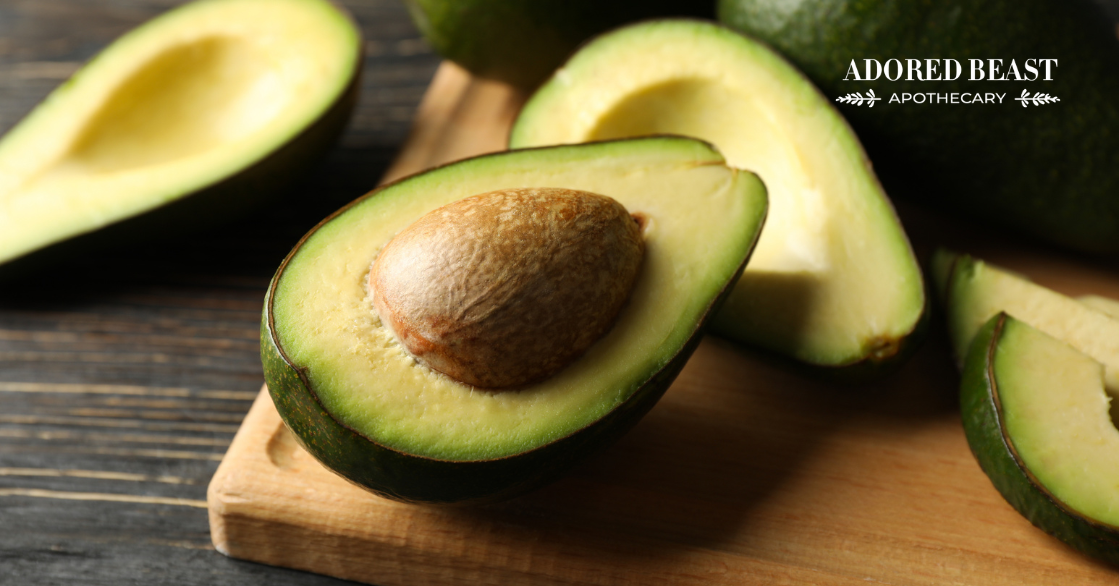Oh, avocado… avocado on toast, guacamole, avocado brownies (yes, that’s a real thing!).
Avocado is often praised as a superfood for humans, thanks to its rich nutritional profile and heart-healthy fats. We’ve learned over the last few years that avocado is a big win when it comes to healthy foods.
But what about our canine companions – can dogs eat avocado? When we’re chopping it up for a salad or sauce, can we share?
While avocado does offer some health benefits for dogs, there are important cautions to consider, particularly when it comes to the skin, pit, and a compound called persin…
The Nutritional Profile of Avocado
Avocado is packed with essential nutrients, making it a powerhouse for both humans and dogs, including:
- Vitamins: Avocados are a good source of vitamins A, C, E, and K, all of which support a dog’s overall health, from immune function to vision and skin health.
- Fiber: The fiber in avocado aids digestion and can help keep your dog’s digestive system running smoothly.
- Potassium: Avocados are high in potassium, which helps maintain proper muscle and nerve function.
Healthy Fats: Avocado is rich in monounsaturated fats, often referred to as “good fats.” These fats are beneficial for heart health and can help maintain healthy skin and coat in dogs.
The term “good fats” refers to healthy, unsaturated fats that play an essential role in the body. Unlike saturated fats, which can raise cholesterol and lead to heart disease, monounsaturated fats help reduce bad cholesterol levels and support cardiovascular health. For dogs, these fats contribute to:
- Skin and Coat Health: Monounsaturated fats help keep your dog’s skin moisturized and their coat shiny. If your dog suffers from dry skin or a dull coat, healthy fats like those in avocado can help alleviate these issues.
- Energy: Fats are a key source of energy for dogs. Good fats, like those found in avocado, provide sustained energy that can fuel your dog’s daily activities.
- Heart Health: Just like in humans, healthy fats can support heart health in dogs by promoting good circulation and reducing inflammation.
Health Benefits of Avocado for Dogs
Ok, they’re healthy, but can dogs eat avocado? Yes (with some cautions – covered below). When given in moderation, avocado can offer a range of health benefits for dogs:
- Boosts Immune System: The vitamins and antioxidants in avocado can help strengthen your dog’s immune system, making them better equipped to fight off infections and illnesses.
- Supports Digestive Health: The fiber content in avocado can aid digestion, helping to regulate your dog’s bowel movements and prevent constipation.
- Anti-Inflammatory Properties: Avocado’s healthy fats and antioxidants help reduce inflammation, which is particularly beneficial for dogs with arthritis or joint pain.
- Promotes Healthy Skin and Coat: As mentioned earlier, the fats in avocado contribute to a glossy coat and healthy skin, especially for dogs prone to dry, flaky skin.
Taking Precautions
While avocado flesh can be beneficial for dogs, certain parts of the avocado should be avoided due to potential risks.
Firstly, both the pit and skin can present choking risks. Avocado pits are large and hard, posing a serious choking hazard to dogs. If swallowed, the pit can also cause a blockage in your dog’s digestive tract, leading to a life-threatening emergency that may require surgery. And the skin is tough and difficult for dogs to digest. Always ensure that you only offer your dog the flesh, and that it is cut into small, manageable pieces.
Secondly, you need to be careful of persin.
Persin is a fungicidal toxin found in the leaves, skin, pit, and flesh (in much smaller amounts) of the avocado plant. While dogs are more resistant to persin than some animals (like birds or horses), consuming large amounts can still cause problems.
- How to Avoid Persin Issues: To minimize the risk of persin exposure, only feed your dog avocado flesh. Never give them the skin, pit, leaves, or any part of the avocado tree. And always feed in moderation –
- Symptoms of Persin Poisoning: If a dog consumes too much persin, it can lead to gastrointestinal upset, such as vomiting or diarrhea. In extreme cases, consuming large quantities of avocado skin or pit could lead to more severe symptoms, such as difficulty breathing or fluid accumulation around the heart.
How to Safely Feed Avocado to Your Dog
If you’d like to share avocado with your dog, it’s important to do so safely. Here are some tips for feeding avocado to your dog:
- Start Small: Offer a small amount of plain avocado flesh to ensure your dog doesn’t have any sensitivities. If they tolerate it well, you can occasionally offer small pieces as a treat.
- Avoid Seasoning: Don’t add salt, spices, or other ingredients to the avocado, as these can be harmful to your dog. Plain, ripe avocado flesh is best – no guacamole please!
So, can dogs eat avocado? Yes – and also no, at least not the whole fruit. While dogs can eat avocado in moderation, it’s important to be aware of the potential risks, especially the choking hazard posed by the pit and the toxicity of persin in the skin and leaves. The good news is that the flesh of the avocado contains healthy fats and nutrients that can benefit your dog’s skin, coat, and overall health. If you’re careful about how you prepare it, avocado can be a nutritious, occasional treat for your furry friend.












